Introduction
WhatsApp for marketing has emerged as a powerful contender to traditional email campaigns.
As businesses seek more effective ways to reach their audience, marketing on WhatsApp has gained significant traction. Recent statistics reveal that WhatsApp boasts over 2.7 billion monthly active users worldwide (Statista, 2024), making it an invaluable platform for marketers.
WhatsApp marketing solutions have shown impressive engagement rates, with messages achieving an average open rate of 98% compared to email's 20% (MobileMonkey, 2024). This stark difference highlights the potential of marketing with WhatsApp to cut through the noise of cluttered inboxes.
Furthermore, the integration of WhatsApp chatbots has revolutionized customer interactions. Studies show that 69% of consumers prefer chatbots for quick communication with brands (Outgrow, 2024).
Implementing a chatbot for WhatsApp can lead to a 70% reduction in customer service costs while improving response times by 80% (IBM, 2024).
As we delve deeper into the comparison between WhatsApp marketing and email marketing, we'll explore how these statistics translate into real-world advantages for businesses leveraging WhatsApp's unique features and vast user base.
What is WhatsApp Marketing?
WhatsApp marketing is a form of direct messaging marketing that leverages the popular messaging app WhatsApp to connect with customers and prospects.
Key features of WhatsApp marketing include broadcast messaging, group chats, and multimedia sharing. Broadcast messaging allows businesses to send messages to multiple recipients simultaneously without creating a group.
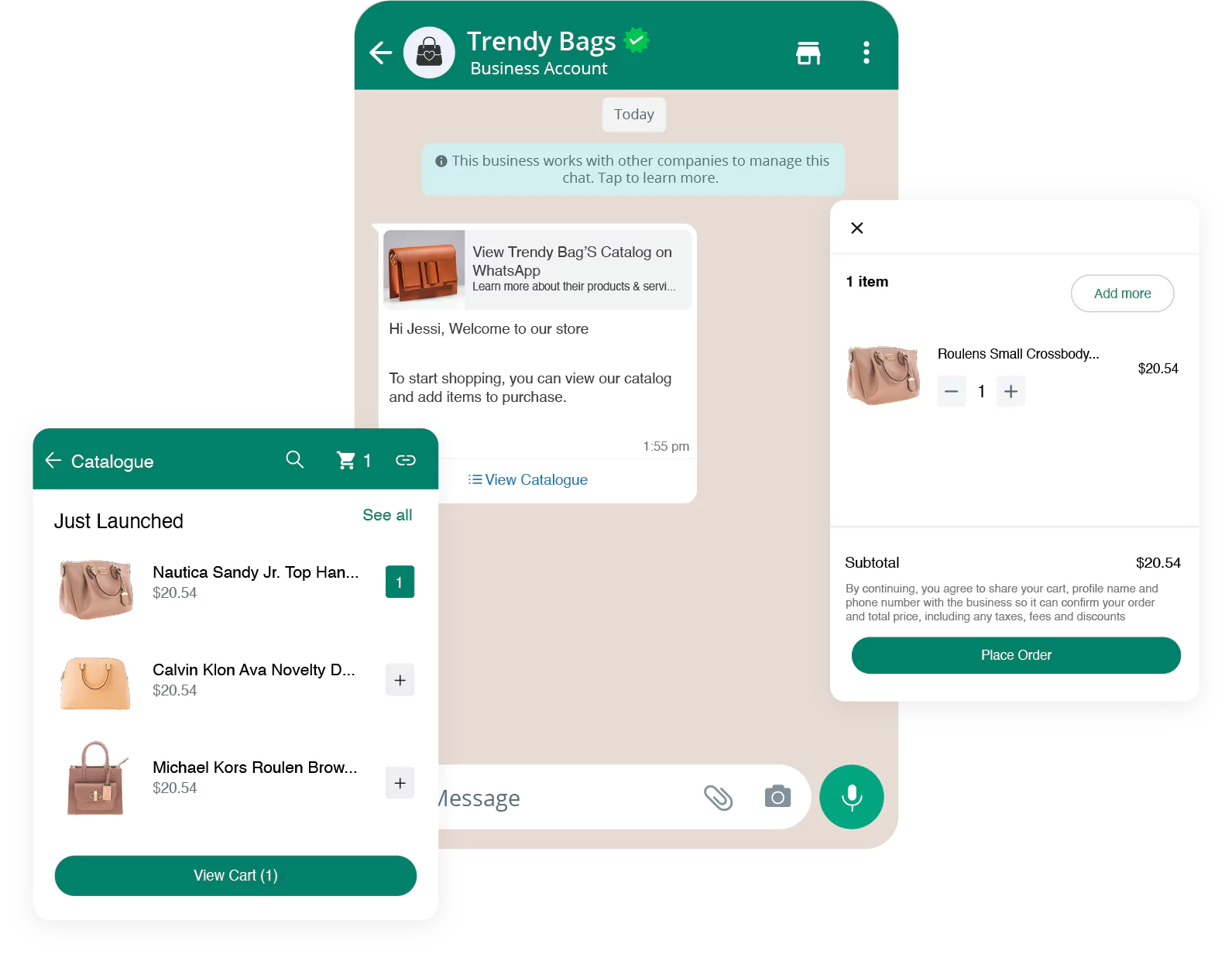
Group chats facilitate real-time engagement with multiple users, ideal for customer support and community building. Multimedia sharing enables the distribution of text, images, videos, and audio, making communications rich and engaging.
The benefits of WhatsApp marketing include high engagement rates, personalized communication, and cost-efficiency. WhatsApp boasts high open and response rates, ensuring messages are seen and acted upon.
Personalized communication is easily achieved, fostering stronger customer relationships and loyalty. The platform's global reach and minimal costs make it an affordable marketing tool for businesses of all sizes.
Additionally, WhatsApp's end-to-end encryption ensures secure and private interactions, building customer trust.
What is Email Marketing?
Email marketing is a digital marketing strategy that involves sending emails to a targeted audience to promote products, services, or content.
Key features of email marketing include personalization, segmentation, and automation. Personalization allows businesses to tailor messages to individual recipients, enhancing engagement.
Segmentation involves dividing the email list into smaller groups based on specific criteria, ensuring relevant content is sent to the right people. Automation streamlines the process by scheduling and triggering emails based on user behavior or predefined conditions.
The benefits of email marketing include cost-effectiveness, direct communication, and measurable results. It is significantly cheaper than traditional marketing methods and offers a high return on investment.
Email marketing provides a direct line of communication to customers, fostering strong relationships and brand loyalty.
Additionally, the performance of email campaigns can be easily tracked through metrics such as open rates, click-through rates, and conversion rates, allowing for continuous optimization and improvement.
Let's get started with comparing Whatsapp Marketing vs Email Marketing. Below is a detailed comparison of the same:
Engagement Metrics Comparison: WhatsApp Marketing Vs Email Marketing
When it comes to comparing key engagement metrics between WhatsApp marketing and email marketing, there are several factors to consider.
The main metrics we will focus on include open rates, click-through rates, and response rates. Each of these metrics provides valuable insights into how users interact with marketing messages on both platforms.
Open Rates: WhatsApp Marketing Vs Email Marketing
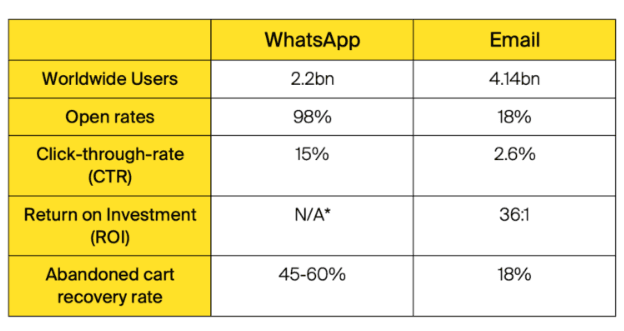
Open rates are a critical metric for measuring the effectiveness of a WhatsApp marketing campaign. In general, WhatsApp tends to have higher open rates compared to email.
Users are more likely to open a WhatsApp message since it appears directly in their chat list, making it hard to miss. On the other hand, emails may get lost in a crowded inbox or end up in the spam folder.
Recent stats and trends show that WhatsApp messages have an open rate of around 70-80%, while email open rates typically range from 20-30%.
This significant difference highlights the importance of using WhatsApp marketing to reach a larger audience and ensure that your messages are seen by more users.
Click-Through Rates: WhatsApp Marketing Vs Email Marketing
Click-through rates measure the number of users who engage further with a marketing message by clicking on a link or taking a specific action.
When comparing WhatsApp and email marketing, WhatsApp tends to have higher click-through rates as well. This is because WhatsApp messages feel more personal and direct, leading to higher engagement levels.
For example, a WhatsApp message from a business may contain a direct link to a product or service, prompting users to click for more information.
On the other hand, emails may require users to open the message, scroll through the content, and then click on a link, adding more steps to the process.
Response Rates: WhatsApp Marketing Vs Email Marketing
Response rates indicate how likely users are to interact with a marketing message by replying or taking action.
WhatsApp often outshines email in terms of response rates due to its real-time nature and instant communication capabilities. Users are more inclined to respond to a WhatsApp message since it feels like a conversation rather than a promotional email.
On average, response rates for WhatsApp marketing campaigns range from 40-60%, while email response rates hover around 10-20%. This difference underscores the importance of using WhatsApp to engage with your audience and encourage meaningful interactions.
Reach and Audience Comparison: WhatsApp Marketing Vs Email Marketing

To understand the reach and audience penetration of WhatsApp marketing compared to email marketing, let's dive into the global and demographic insights of these two platforms.
Global Reach: WhatsApp Marketing Vs Email Marketing
WhatsApp boasts a massive user base worldwide, with over 2 billion active users as of 2021. This widespread adoption makes it a powerful tool for reaching a global audience.
On the other hand, email also has a significant reach, with an estimated 4 billion users globally. While email has been around longer and has a larger user base, WhatsApp's user engagement is higher, making it a preferred platform for direct communication.
In terms of geographic distribution, WhatsApp is popular in countries like India, Brazil, Mexico, and Indonesia. These regions have a high usage of WhatsApp for personal and business communication.
On the contrary, email is widely used across the globe, making it a more universal marketing channel. Understanding the geographic distribution of these platforms can help in targeting specific regions for marketing campaigns.
Demographic Reach: WhatsApp Marketing Vs Email Marketing
When it comes to demographic insights, WhatsApp appeals to a younger demographic, with a large user base in the 18-34 age group.
This age group is highly active on WhatsApp, making it an ideal platform for connecting with younger audiences.
On the other hand, email is more commonly used by older demographics, particularly those aged 35 and above. Understanding these demographic differences is crucial for tailoring marketing messages to the right audience.
Cost and ROI Analysis Comparison: WhatsApp Marketing Vs Email Marketing
When it comes to marketing on WhatsApp and email campaigns, one of the critical factors to consider is cost efficiency and return on investment (ROI).
Let's delve deeper into the analysis of the cost per message/email and ROI for both platforms to understand which one offers better value for marketers and businesses.
Cost Per Message/Email
Understanding the cost involved in sending messages or emails is essential for budgeting and assessing the overall expenditure of your marketing campaigns.
In the case of WhatsApp marketing, the cost per message typically varies based on the service provider and the volume of messages sent. On the other hand, email marketing costs are primarily determined by the email service provider and the size of the email list.
In the case of WhatsApp marketing, the cost per message is usually higher compared to emails, especially if you are utilizing chatbots for marketing purposes.
The implementation of chatbots for WhatsApp marketing may incur additional costs, but it also offers the advantage of automated interactions with customers, leading to potentially higher engagement levels.
On the contrary, email marketing generally has lower costs per email, allowing businesses to reach a broader audience at a relatively lower cost.
However, the effectiveness of email marketing in terms of open rates and click-through rates should also be taken into consideration when assessing the cost per email.
Return on Investment (ROI)
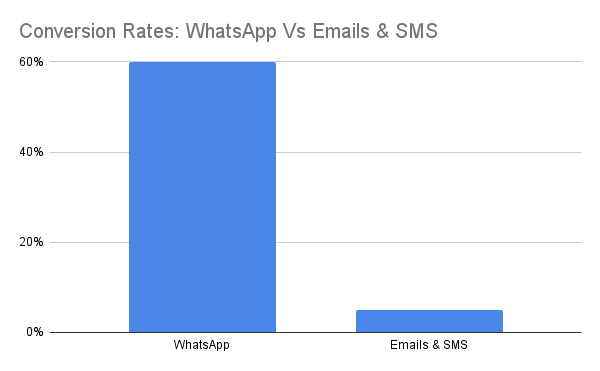
ROI is a crucial metric that measures the efficiency and effectiveness of WhatsApp marketing campaigns in generating revenue and achieving business goals. When comparing the ROI of marketing with WhatsApp and email, several factors come into play.
WhatsApp marketing, although it may have a higher cost per message, often yields higher engagement rates due to the personal and instant nature of WhatsApp communication.
This higher engagement can lead to better conversion rates and ultimately a higher ROI. Additionally, the use of chatbots for WhatsApp marketing can streamline customer interactions, further enhancing the ROI potential.
On the other hand, email marketing, while having lower costs per email, may face challenges in terms of deliverability, open rates, and engagement levels.
The effectiveness of email campaigns largely depends on the quality of the email content, the relevance to the target audience, and the overall email marketing strategy employed.
In terms of ROI comparison, WhatsApp marketing, and email marketing both have their strengths and weaknesses.
Deliverability and Reliability Comparison: WhatsApp Marketing Vs Email Marketing
When it comes to reaching your audience effectively, message deliverability rates are crucial for both WhatsApp marketing and email marketing.
Let's delve into the statistics to understand how each platform fares in terms of delivering messages to users.
WhatsApp Deliverability Stats
WhatsApp marketing boasts a high deliverability rate, with messages being delivered directly to users' inboxes in real time.
This instant delivery feature ensures that your messages are promptly received and read by the target audience.
WhatsApp's end-to-end encryption also adds an extra layer of security and privacy to your messages, enhancing the overall deliverability.
Email Deliverability Stats
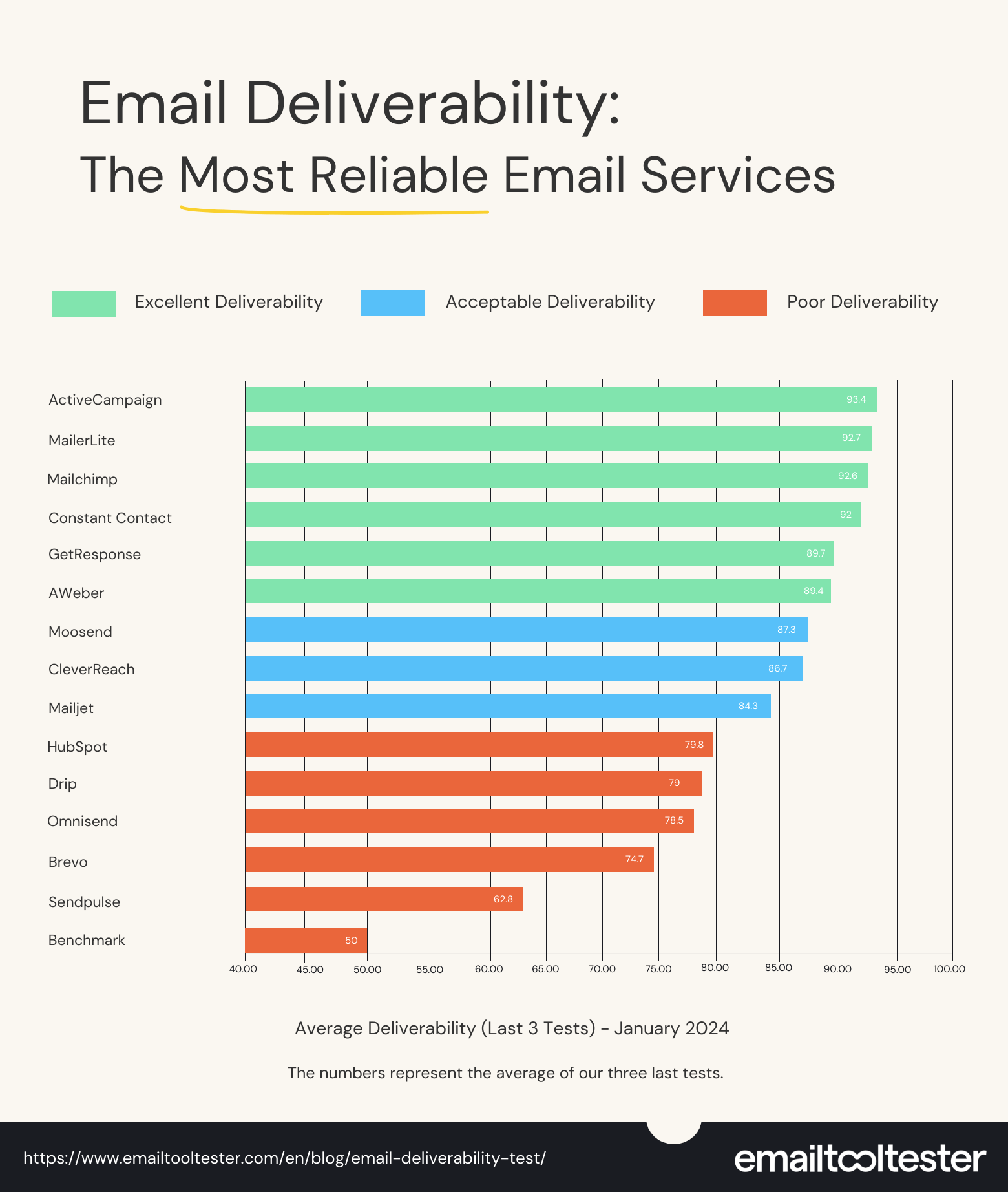
On the other hand, email deliverability rates can be influenced by various factors such as sender reputation, spam filters, and email authentication protocols.
According to recent studies, the average email deliverability rate across industries is around 80-85%.
This means that roughly 15-20% of emails sent may not reach the intended recipients' inboxes, posing a challenge for email marketers in ensuring reliable communication with their audience.
Factors Affecting Deliverability
One of the key challenges for WhatsApp deliverability is the need for users to have the app installed on their devices to receive messages.
This limitation can impact the reach of your marketing campaigns, especially if your target audience is not actively using WhatsApp.
Additionally, strict anti-spam policies by WhatsApp can lead to an account suspension if your messages are reported as spam by users, affecting your deliverability rates.
For email marketing, sender reputation plays a significant role in determining deliverability rates. Factors such as high bounce rates, low engagement levels, and spam complaints can negatively impact your sender score, leading to a decrease in deliverability.
Email authentication protocols like SPF, DKIM, and DMARC are crucial for ensuring that your emails are properly authenticated and delivered to recipients' inboxes.
User Experience and Engagement Comparison: WhatsApp Marketing Vs Email Marketing
WhatsApp marketing and Email both offer personalization features that allow marketers to tailor their messages to the preferences and interests of their audience.
WhatsApp vs Email Personalization Features
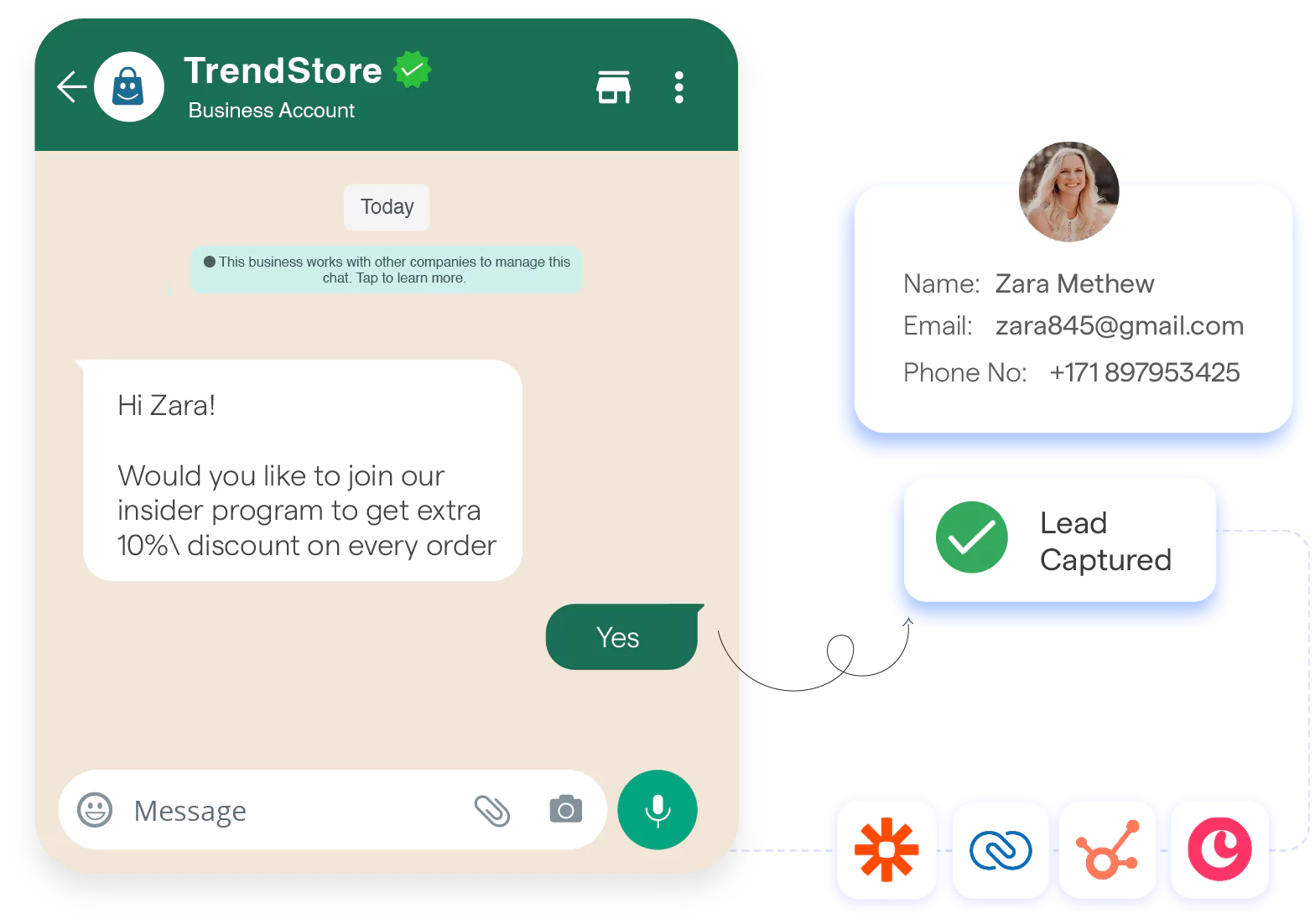
WhatsApp marketing provides a more interactive and personalized experience with the use of features like chatbots for instant responses and personalized message templates.
On the other hand, Email allows for personalization through customized subject lines, sender names, and dynamic content based on user behavior.
Content Types and Formats
Both WhatsApp marketing and Email support a variety of content types such as text, images, videos, and multimedia.
This versatility enables marketers to create engaging and visually appealing messages that resonate with their target audience.
Suggested Reading:
11 Tips for Running Successful WhatsApp Marketing Campaigns
User Interaction and Feedback
Users interact with messages differently on WhatsApp marketing and Email platforms.
In WhatsApp, users can engage with messages by replying, forwarding, and sharing them with their contacts.
Additionally, WhatsApp also allows for quick feedback through emojis and quick responses. On the other hand, Email users typically interact by clicking on links, replying to emails, or unsubscribing from mailing lists.
Privacy and Compliance
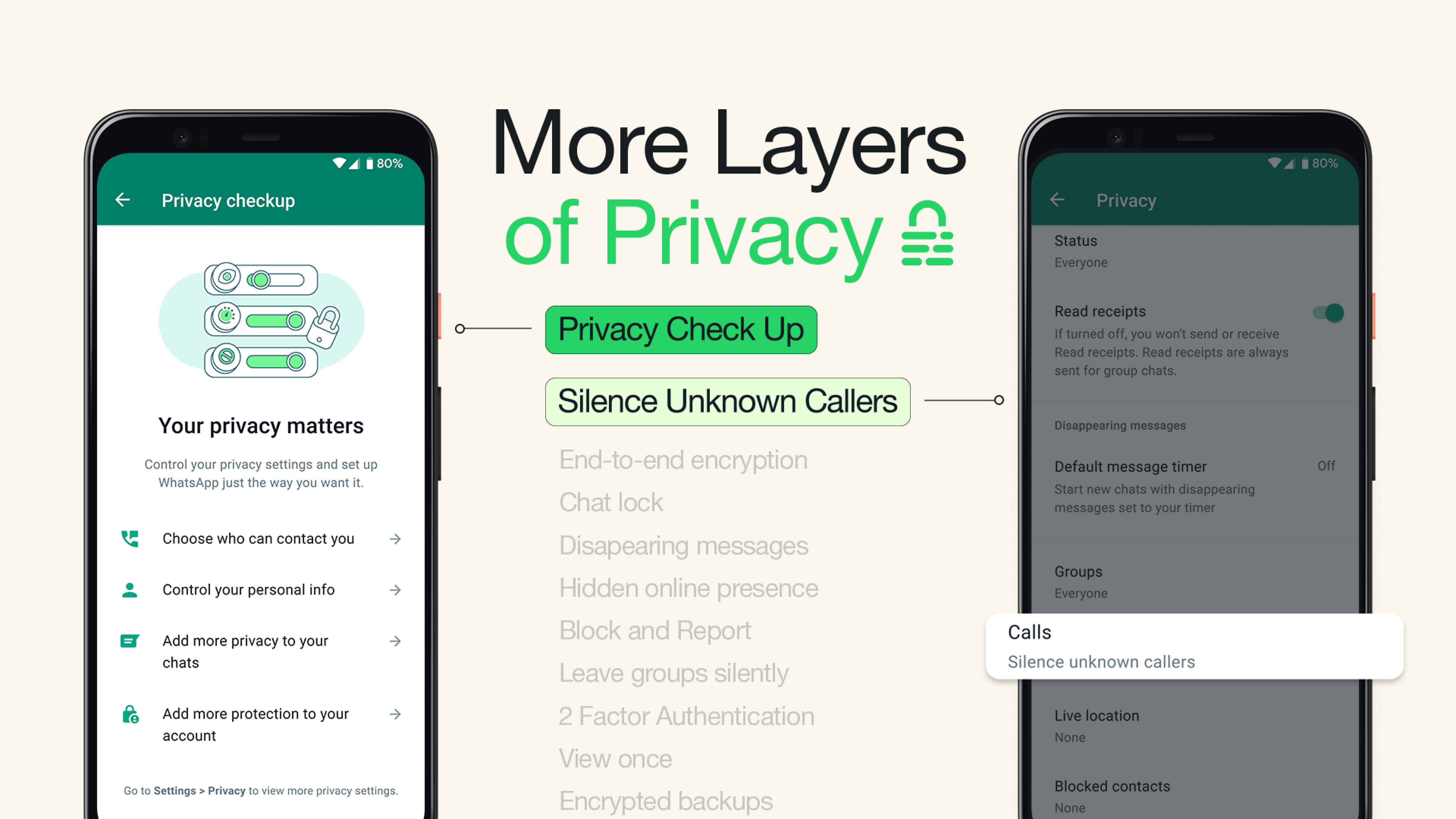
It is essential to adhere to data protection regulations to ensure the security and privacy of user information.
These regulations vary by country and region but generally require businesses to obtain user consent before collecting and using personal data for marketing purposes.
In the European Union, the General Data Protection Regulation (GDPR) sets strict guidelines for data protection and imposes hefty fines on businesses that fail to comply.
Compliance Requirements for WhatsApp and Email
When it comes to WhatsApp marketing solutions and marketing with WhatsApp, businesses must follow the terms of service outlined by WhatsApp.
These terms prohibit the use of automated messaging for marketing purposes and require businesses to obtain explicit consent from users before sending them promotional messages.
On the other hand, email marketing is governed by laws such as the CAN-SPAM Act, which mandates that businesses provide an opt-out option in promotional emails and disclose their physical address.
User Privacy Concerns
Users have growing concerns about their privacy and data security, especially in the context of chatbot for WhatsApp and WhatsApp chatbot interactions.
Many users are wary of sharing personal information with businesses on messaging platforms like WhatsApp due to the potential for data breaches and misuse.
Similarly, email users are often bombarded with spam emails and phishing attempts, leading to increased skepticism about sharing personal information via email.
Integration with Other Marketing Tools
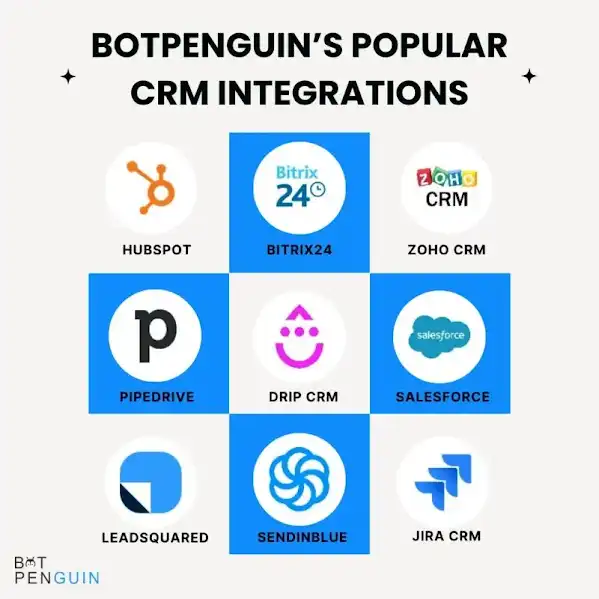
Both WhatsApp marketing and Email marketing platforms offer robust integration with Customer Relationship Management (CRM) systems.
These systems allow businesses to manage customer interactions, store user data, and track engagement effectively.
WhatsApp marketers can sync their CRM databases to send personalized messages based on user history and preferences.
Similarly, Email marketers can leverage CRM integration to segment their audience and send targeted campaigns to specific customer groups.
Analytics and Reporting Tools
WhatsApp marketing and Email marketing tools provide advanced analytics and reporting features to track the performance of marketing campaigns.
Marketers can measure message delivery rates, open rates, click-through rates, and user engagement metrics on both platforms.
Email marketing platforms offer detailed reports on user behavior, such as email interaction patterns, subscriber demographics, and campaign effectiveness.
WhatsApp analytics include response rates, user engagement data, and insights into message effectiveness.
Suggested Reading:
WhatsApp Marketing Strategies for Generating Leads
Automation Tools
Automation tools play a crucial role in streamlining marketing processes on both WhatsApp and Email platforms.
Marketers can schedule messages, automate responses, and set up drip campaigns using automation features.
Automation helps in delivering timely and relevant messages to users, ensuring consistent communication and engagement. By automating repetitive tasks, marketers can focus on creating valuable content and optimizing their campaigns for better results.
Future Trends and Predictions of WhatsApp Marketing
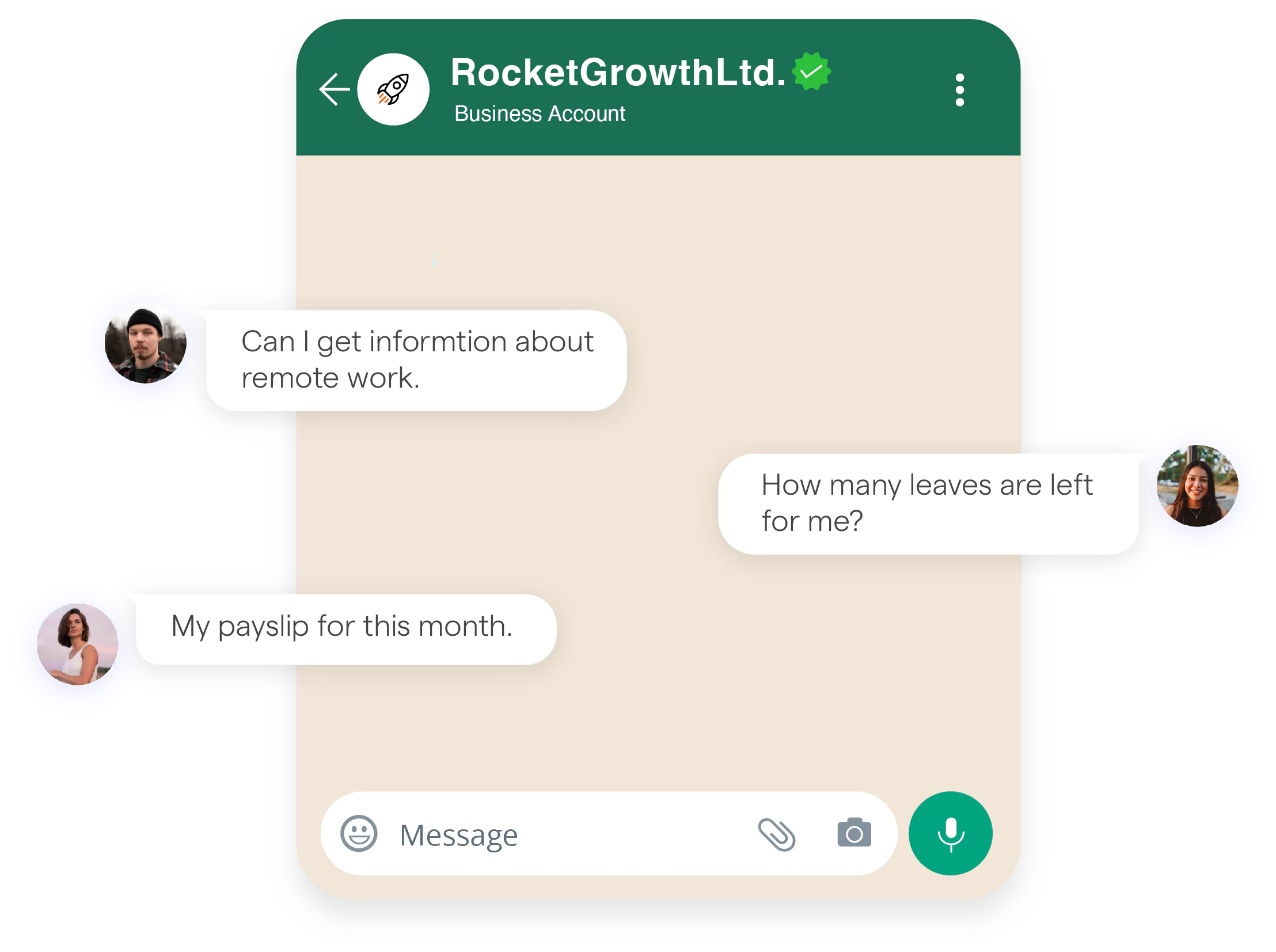
In the year 2024, one of the significant trends in WhatsApp marketing is the integration of Artificial Intelligence (AI).
AI technology will be utilized to automate responses, provide personalized interactions with users, and streamline communication processes.
This integration will enhance user engagement, improve response times, and create more personalized experiences for customers.
Another emerging trend in WhatsApp marketing for 2024 is the increasing use of chatbots.
Chatbots on WhatsApp are being implemented for customer service purposes, enabling businesses to provide immediate responses to customer inquiries, handle frequently asked questions, and offer seamless communication with users.
Chatbots will play a crucial role in enhancing customer support, increasing efficiency, and improving the overall user experience on the platform.
Emerging Trends in Email Marketing for 2024
Looking ahead to 2024, email marketing is witnessing a trend towards interactive content.
Interactive elements such as embedded forms, surveys, and quizzes are being incorporated into email campaigns to engage users, gather feedback, and encourage interaction.
Interactive emails provide a dynamic and engaging experience for recipients, leading to higher conversion rates, increased user participation, and improved campaign performance.
Another upcoming trend in email marketing for 2024 is the use of Artificial Intelligence (AI) for personalized targeting. AI technology is being leveraged to analyze user behavior, preferences, and interactions to deliver tailored email content to individual recipients.
Conclusion
As we've explored, the statistics demonstrate the growing power of marketing on WhatsApp compared to traditional email campaigns.
WhatsApp for marketing offers unprecedented reach and engagement, making it an essential tool for businesses looking to connect with their audience in 2024 and beyond.
The high open rates and direct nature of WhatsApp marketing solutions provide a significant advantage over email, allowing businesses to cut through the noise and deliver messages that resonate.
Moreover, the integration of a WhatsApp chatbot has revolutionized customer service, offering instant, personalized interactions that email simply cannot match.
However, it's important to note that marketing with WhatsApp should complement, rather than replace, email marketing strategies.
Each channel has its strengths, and a well-rounded approach often yields the best results. As WhatsApp continues to evolve its business features, we can expect even more innovative WhatsApp marketing solutions to emerge.
In conclusion, the statistics paint a clear picture: WhatsApp for marketing is no longer just an option—it's a necessity for businesses aiming to stay competitive in the digital landscape.
By leveraging the unique advantages of marketing on WhatsApp, including its vast user base, high engagement rates, and advanced chatbot capabilities, businesses can create more meaningful connections with their audience and drive impressive results in their marketing efforts.
Frequently Asked Question (FAQs)
What are the main differences between WhatsApp Marketing and Email Marketing?
WhatsApp Marketing involves real-time messaging and higher engagement rates, while Email Marketing offers detailed analytics and extensive reach. Both platforms have unique strengths suited for different marketing objectives.
Which platform has higher open rates in 2024, WhatsApp or Email?
In 2024, WhatsApp generally has higher open rates compared to Email, due to its real-time nature and instant notification system, leading to more immediate engagement from users.
Is WhatsApp Marketing more cost-effective than Email Marketing?
WhatsApp Marketing can be more cost-effective for direct, personalized communication, while Email Marketing often offers better scalability and lower costs per message for large campaigns.
What are the privacy concerns associated with WhatsApp Marketing vs Email Marketing?
WhatsApp Marketing must comply with strict data protection regulations and user consent requirements, while Email Marketing faces challenges with spam filters and ensuring user privacy.
How do response rates compare between WhatsApp and Email Marketing in 2024?
In 2024, WhatsApp Marketing generally boasts higher response rates due to its instant messaging format, fostering quicker user interactions compared to the typically slower responses seen with Email Marketing.
Can WhatsApp Marketing and Email Marketing be integrated into a single strategy?
Yes, integrating WhatsApp and Email Marketing can enhance communication by leveraging the strengths of both platforms, providing real-time engagement through WhatsApp and detailed analytics and reach through Email.




